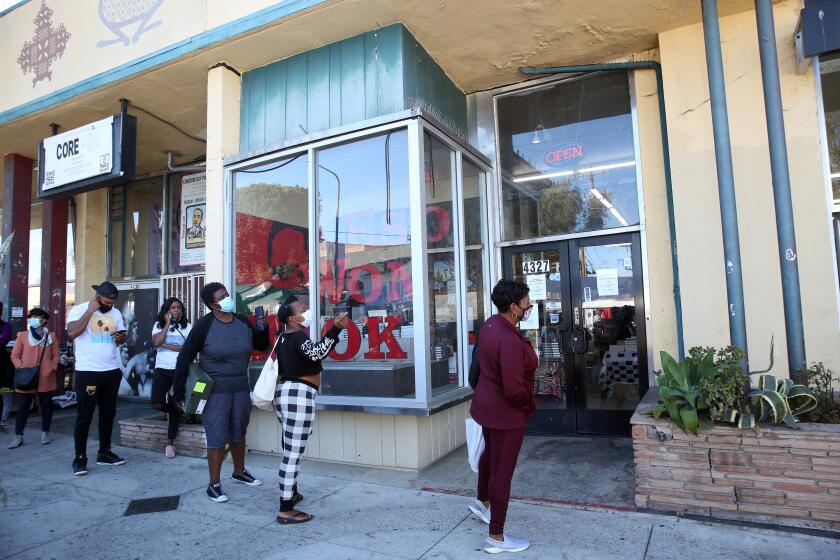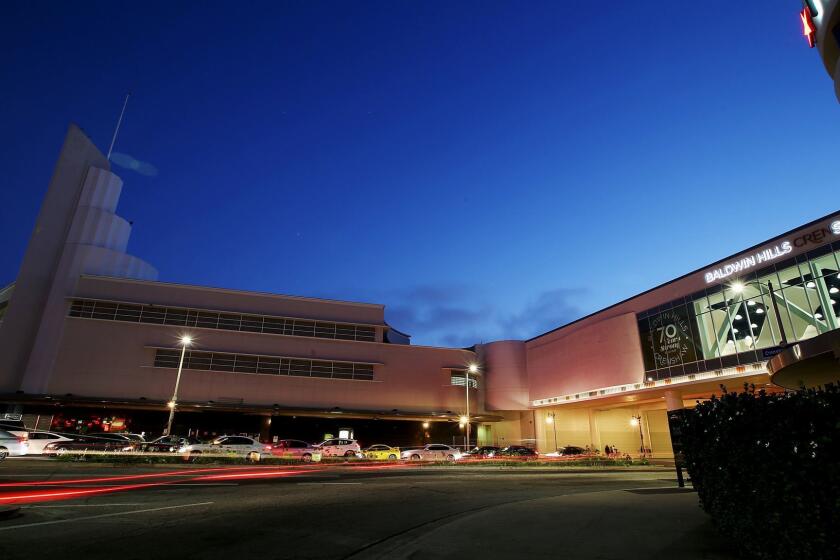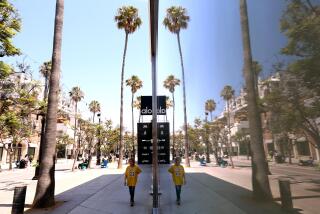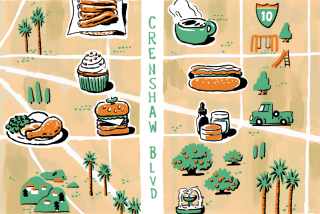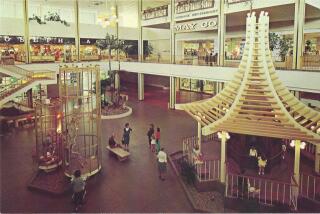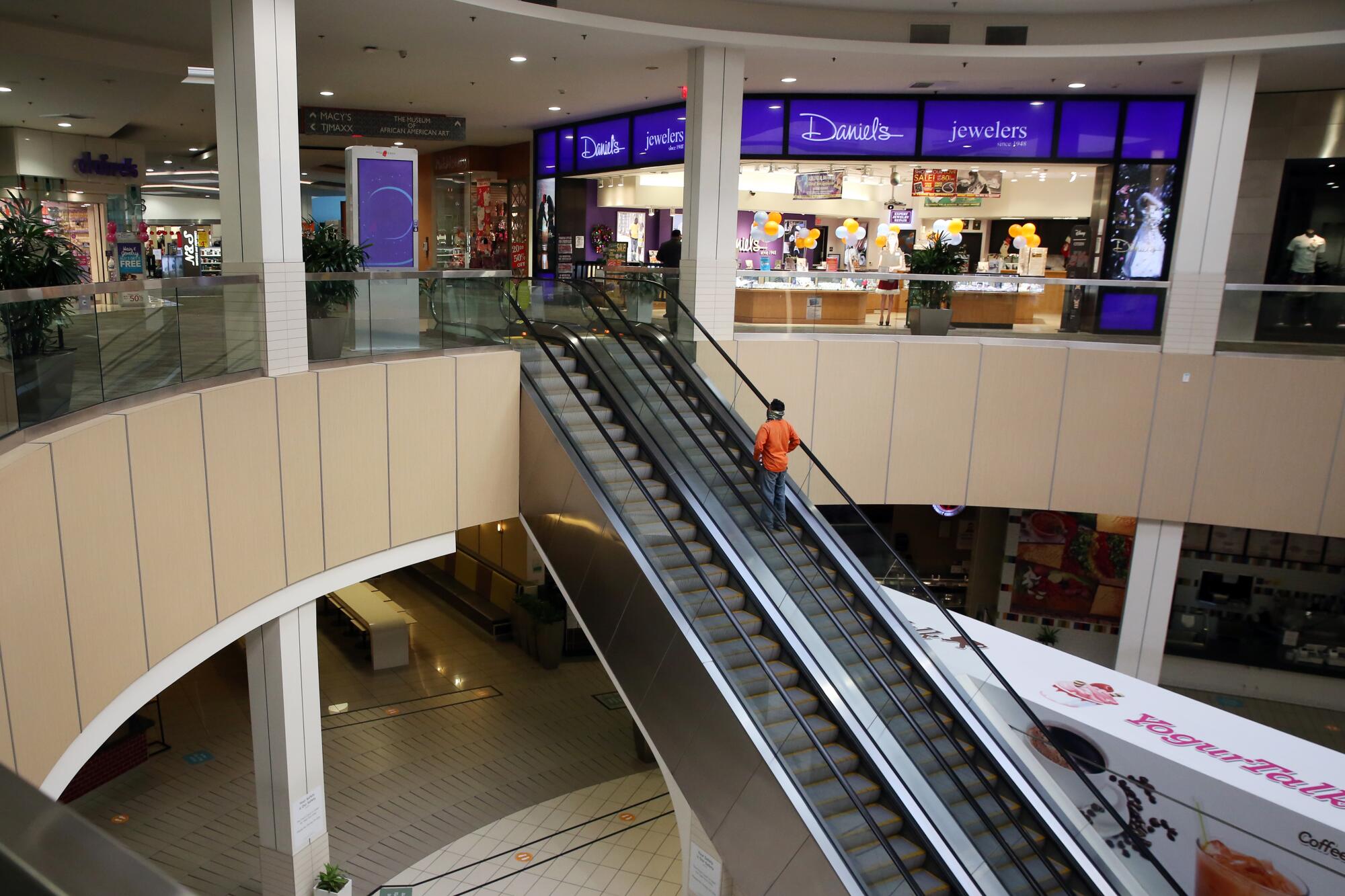
The food court is mostly shuttered. The Museum of African American Art, located improbably inside a Macy’s, is closed for now. And Black Santa is not coming to town.
The Baldwin Hills Crenshaw Plaza may be open, but it doesn’t much feel that way.
For the record:
8:58 a.m. Dec. 22, 2020A previous version of this article misidentified CIM Group’s headquarters as being located in New York. The company is based in Los Angeles.
Gone is the classic mall background noise — Top 40 music drowned out by people talking, walking, rustling shopping bags. Gone are the free weekly workouts and the book readings. The stores have signs in the windows noting that they are open with limited capacity, but more often than not there’s only a lone shopkeeper inside.
A few determined shoppers remain.
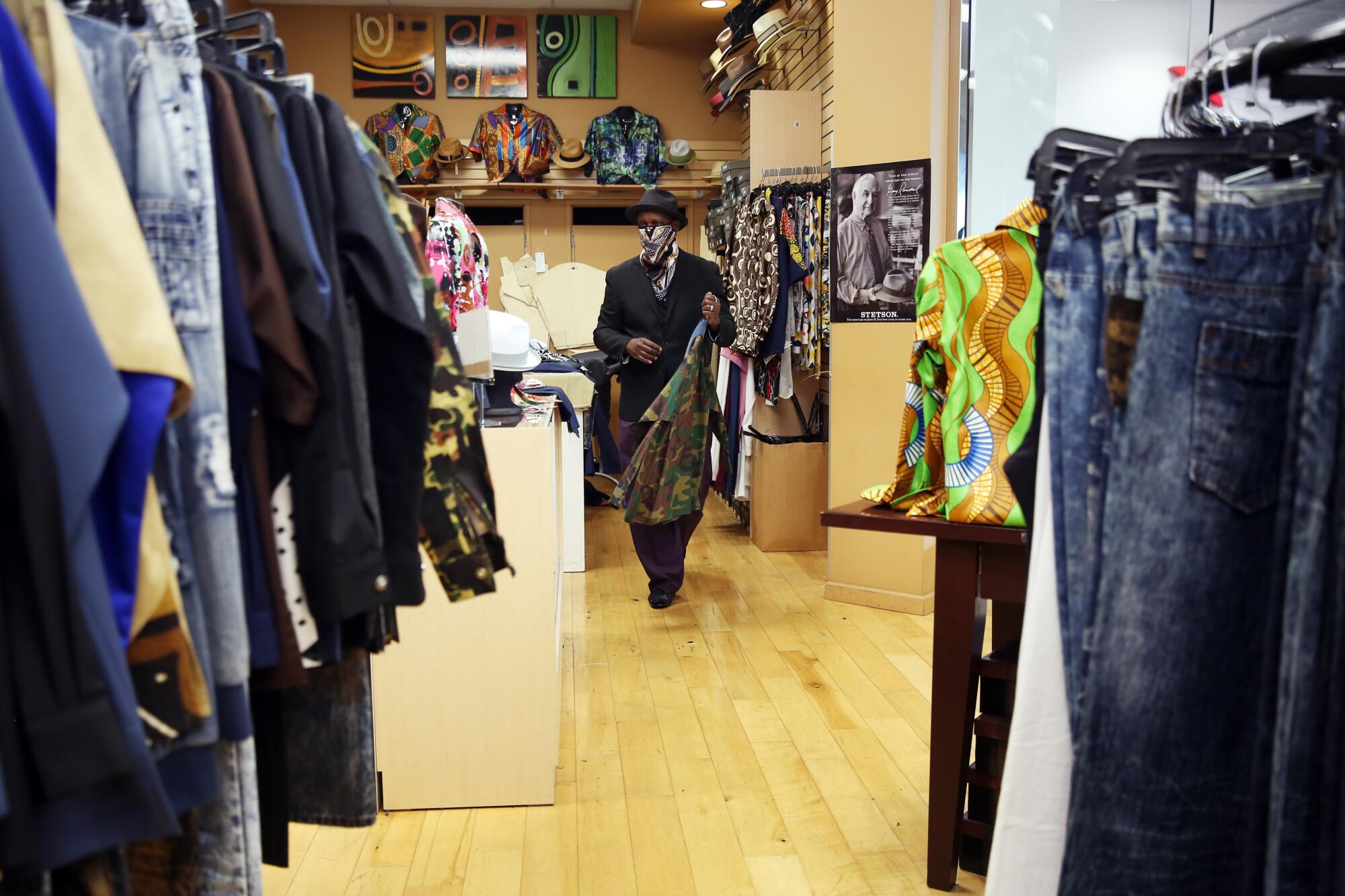
“I could have gone to Fox Hills mall but I said I’m coming here to Crenshaw, and I want to patronize it because it is struggling to come back,” said Yvette Archie, a 60-year-old veterinarian who visited the mall recently to do some Christmas shopping. “I’m hoping that we can keep it in our community and for our community.”
For decades, the Crenshaw mall has been a gathering place for Black Los Angeles and a prime venue for small businesses. Even during the pandemic, the mall has continued to serve the community with food drives and a coronavirus testing site. The mall also holds a weekly farmers market and Melanin Market LA, a showcase for small Black-owned businesses, in its parking lot.
But like its counterparts across the country, the mall has been pushed to the brink by the COVID-19 pandemic. Now, the holiday shopping season — when big and small businesses alike depend on a boost in sales to help pad margins in the new year — has coincided with the worst surge in COVID-19 cases of the pandemic.
Health and government officials have urged people to stay at home but stopped short of closing malls as they had done earlier in the pandemic. Recent orders from the Los Angeles County health department limited indoor mall capacity to 20% and prohibited dining on site.
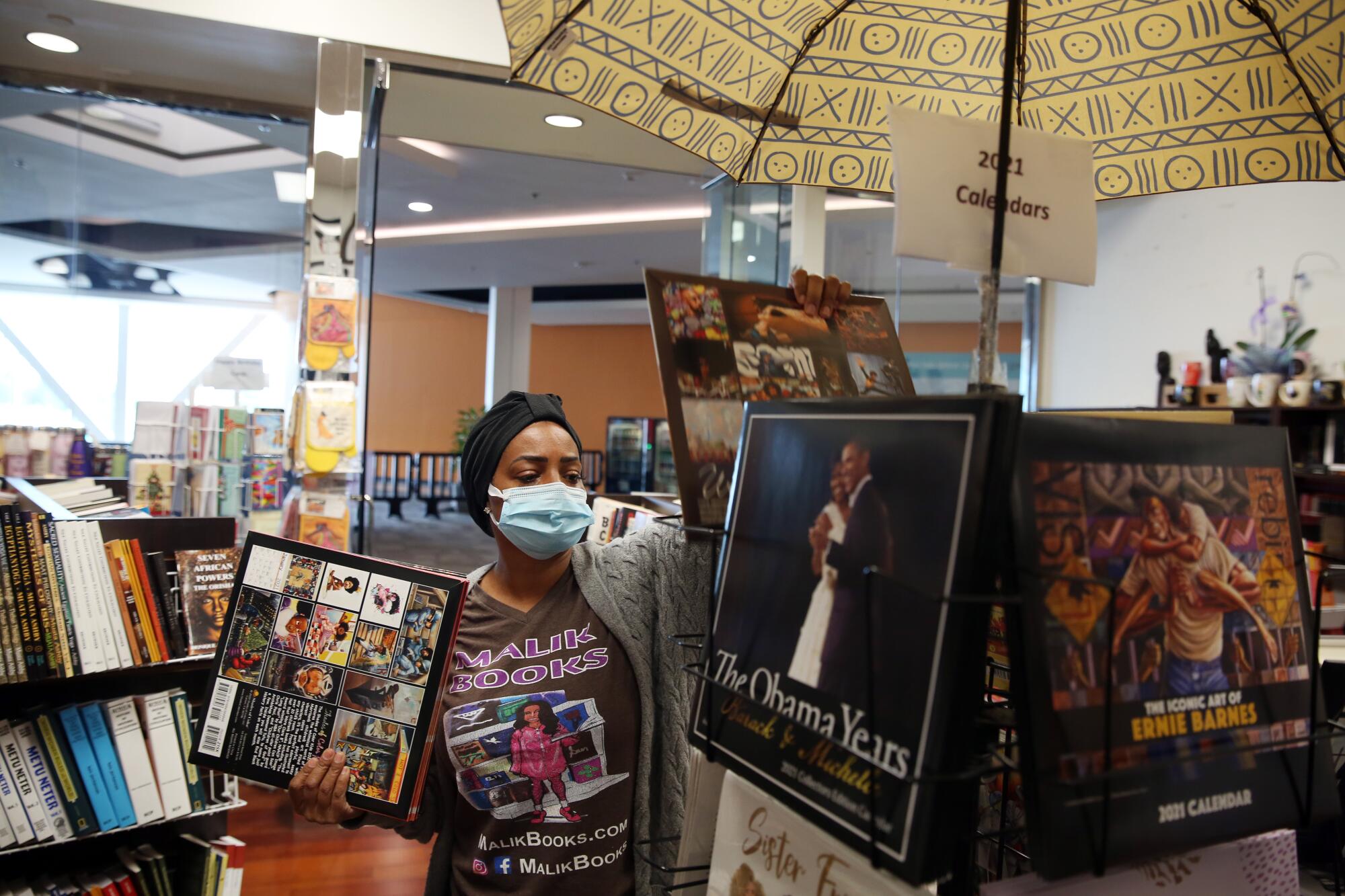
“Every day people say, ‘I didn’t even know the mall was open,’” Malik Muhammad, who co-owns Malik Books with his wife, April, said in an interview. “We’ve been devastated and this mall has been devastated.”
Muhammad, who has been a tenant at the mall on and off since 1994, said he’s never seen traffic this bad. After graduating from the University of Southern California in 1987 with a degree in public administration, he said, he still lacked a “knowledge of self” — specifically, a proper education on Black culture, history and achievements around the world. The bookstore is his way of providing that knowledge to the community.
His inventory includes a mix of autobiographies by prominent Black figures, books on antiracism and organizing, and dozens of picture books featuring Black and brown children.
Across the city on Thanksgiving weekend, indie bookstores greeted lines of customers, kicking off a holiday season of high promise and existential concern.
In the face of the recession, the rise of Amazon and the decimation of small, independent bookstores, Muhammad closed the shop in 2009. Eight years later, sensing a need in the community, he reopened.
Though there has been a steep drop in foot traffic since March, the bookstore has held on thanks to a boost in online purchases and a GoFundMe campaign. The store has also benefited from the nationwide movement to support Black-owned businesses during the pandemic after the summer’s racial justice protests.
“People responded in a very positive and warming way, and we’re grateful and thankful for the people who’ve supported Malik Books,” Muhammad said. “We love them, we appreciate them.”
The changes that have made it harder to run a small bookstore have also hurt the hundreds of regional malls across the country. The rise of e-commerce and a new emphasis on experiences over possessions among younger generations have created a difficult market for the kind of giant anchor stores that help bring in customers to the smaller shops.
The Crenshaw mall lost Walmart, one of its main drivers of foot traffic, in 2016 as part of the company’s global downsizing. Three years later, Sears closed. Now the mall is up for sale.
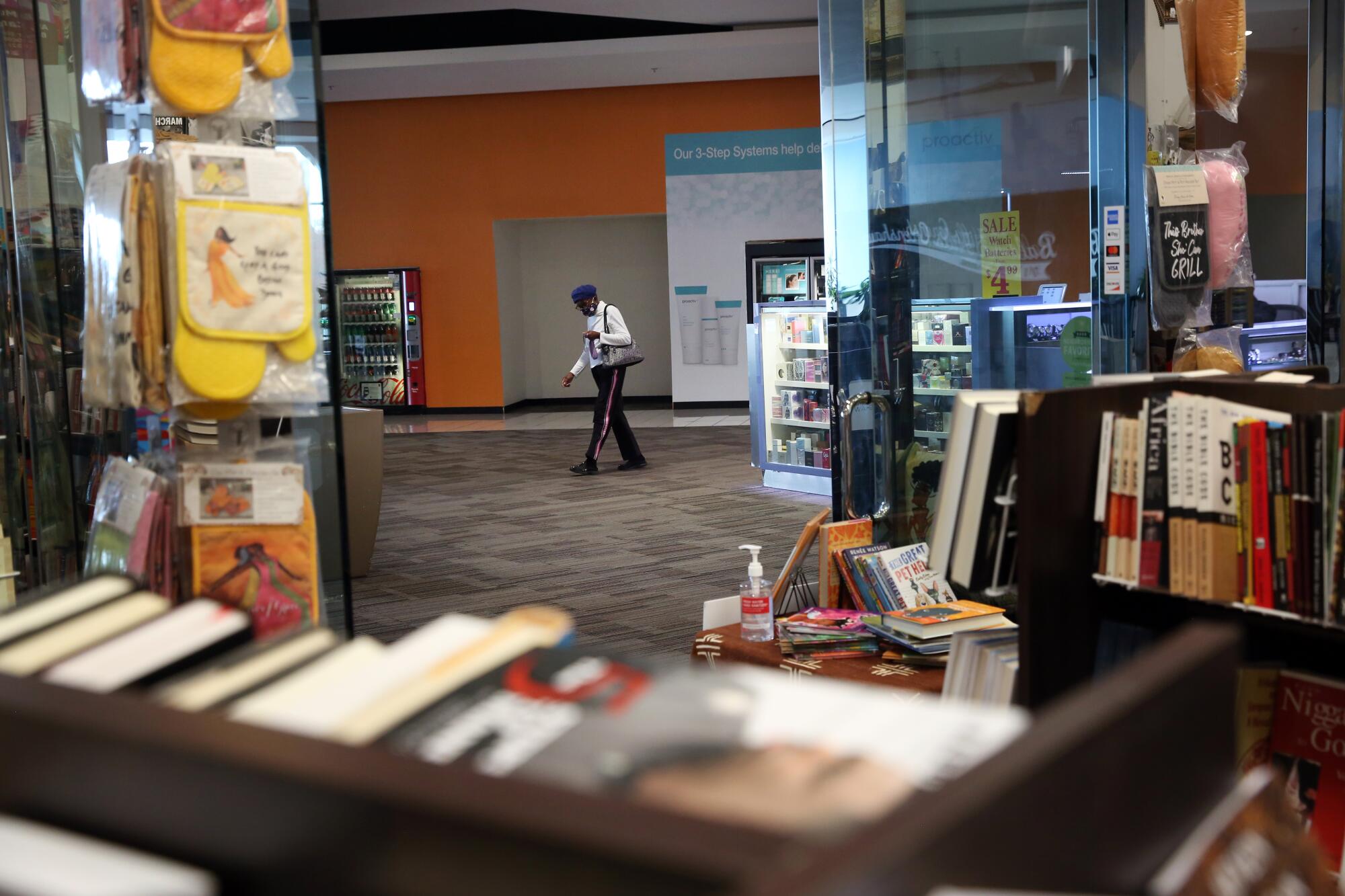
Before the pandemic, Coresight Research, a consulting firm that analyzes the retail industry, estimated that 25% of malls would close in the next five years. Now it expects those closures within the next three years, according to the firm’s president and chief executive, Deborah Weinswig.
To survive, malls will have to modernize and offer more than a traditional shopping experience. Over the last two years, the current owner and prospective buyers have unveiled several proposals to revamp the mall with some combination of office space, apartments, condos, event spaces and a hotel in anticipation of a new light-rail stop expected to open next year when the Crenshaw Line is completed.
The pending sale has left tenants and members of the community to wonder whether the new owners will be committed to maintaining the mall’s role as a community hub for Black Angelenos, or if there will be a completely different complex waiting for them on the other side of the pandemic.
Debuting in 1947 as an open-air shopping center, the mall originally catered to the surrounding area’s white residents. But a Supreme Court decision blocking the enforcement of racially restrictive housing covenants allowed Black people to move into the area, which today is known for its high concentration of affluent and middle-class Black families.
The mall underwent a $100-million renovation in the late 1980s that transformed it from an open-air shopping center into an enclosed space. In 2006, Capri Investment Group purchased the mall for $136 million and has invested $40 million in renovations, including turning the former Magic Johnson Theatres into a Cinemark, and bringing in bigger national chains such as Victoria’s Secret and Chipotle.
“Those are retailers that have historically avoided the South L.A. market and the Crenshaw corridor, so it was a huge win for the community that Capri was able to do that,” said Rachel Freeman, the president and chief executive of Capri Retail Services.
The mall has also become home to a number of small, Black-owned businesses. In 2011, Capri invited Shoneji Robison and Catarah Coleman of Southern Girl Desserts to open a shop after seeing the interest they attracted during the mall’s summer music festival. The current mall ownership was willing to mentor the businesses and give them room to grow and make mistakes, they said.
“They weren’t trying to be the mall in Culver City,” Coleman said. “They were trying to be a mall where the vendors and the ownership of the different stores and businesses were all from the community. And that’s what makes that mall so special.”
Unlike the rest of the restaurants located completely inside the mall, Southern Girl Desserts managed to stay open through its closure because it has one door that leads outside. It has also turned to online sales.
For some shops, however, the switch to online has been more challenging.
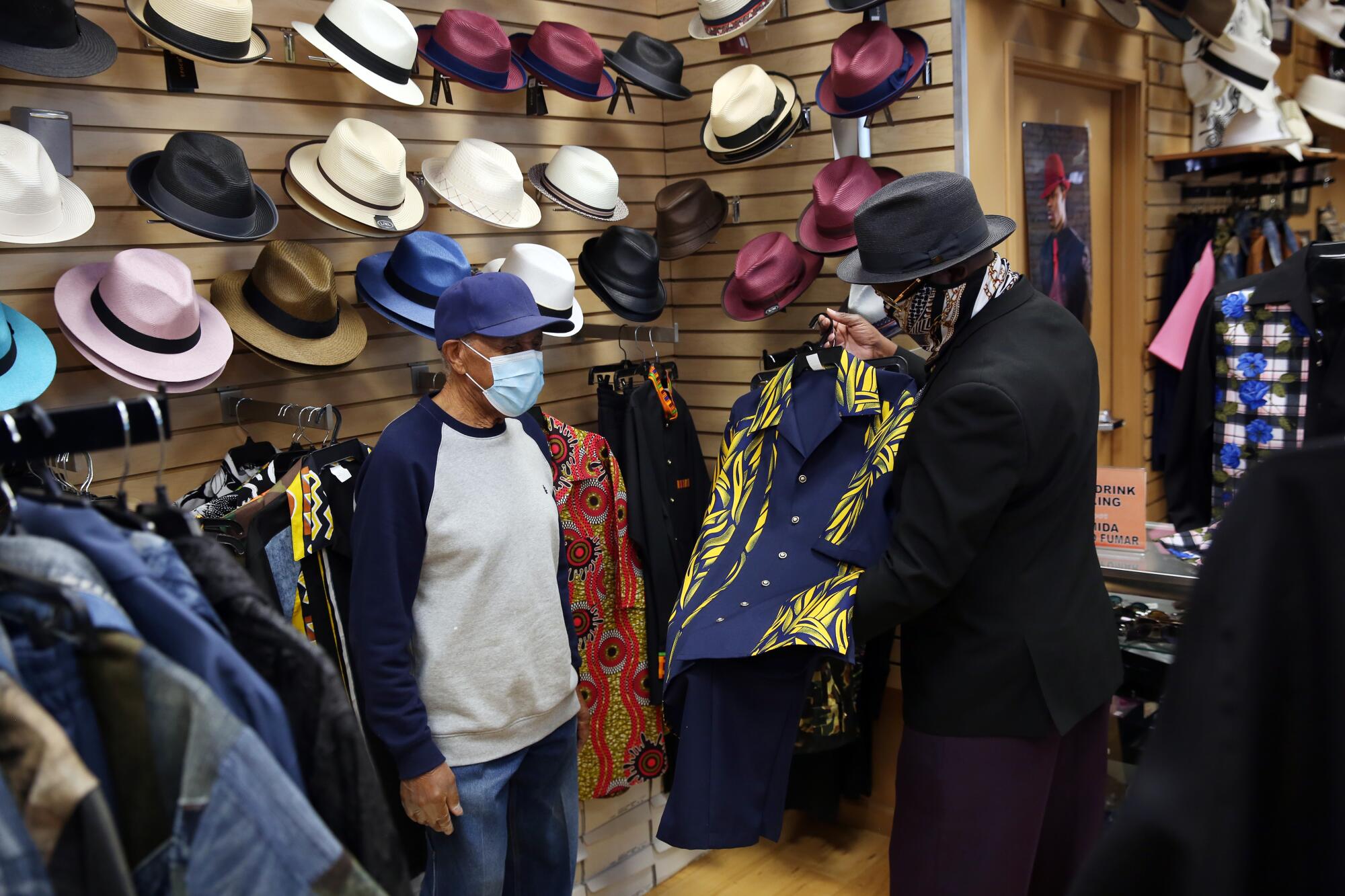
“I don’t understand how in the world people shop online. You must feel that fabric, the size of it, every cut is different,” clothing designer James Brumfield said as he took a break from cutting fabric for a new outfit. For more than 20 years, Brumfield has been selling handcrafted menswear and hats from his shop, James Brumfield Designs. The shop’s tagline is “unique and exotic” and he caters to men 35 and older.
When the mall closed in the spring, Brumfield got to work designing a new collection of denim patchwork outfits that are now on the shelves. Brumfield held up a surprisingly soft button-down shirt from the collection, which comes with matching pants. “It is denim, but then again when you wear it, it’s not quite denim,” he said.
Brumfield attributed his success to the distinct style customers can find only in his shop. Over the years, he’s attracted a loyal following.
Todd Hunnicutt, a 54-year-old retired machine operator, said he would typically wear Brumfield’s designs on a night out or to a jazz festival.
“I used to buy a lot of clothes from this store, a lot of clothes, linen outfits and everything,” Hunnicutt said.
Hunnicutt stopped by the store on a Tuesday afternoon after he saw cars in the mall parking lot. Like many others, he wasn’t sure if the mall was even open, given that it’s been shuttered for much of 2020: from mid-March to mid-June, and again from mid-July to early October.
Foot traffic is down everywhere, but not all malls are feeling the pandemic as deeply as the Crenshaw mall.
On a recent Friday night, dozens of shoppers descended on Westfield Culver City (more commonly referred to as the Fox Hills mall), forming lines outside Sephora, Mac Cosmetics and Champs Sports. Signs in the food court informed shoppers of the new L.A. County mandate preventing the consumption of food and drinks on mall property.
A few miles away, the only line at the Crenshaw mall was outside Bath & Body Works, where customers waited more than an hour to sift through the company’s sale on candles, which have been a hot item during the pandemic.
“This mall was closed for so long, I feel like people don’t even know it’s open,” said Tiffany Potts, a 36-year-old social worker who lives nearby. “I thought it was still closed and then I was like, ‘Oh, shoot, there’s people going in.’”
Potts said she’s been going to the mall less because of the pandemic, but also because there are fewer stores compared with the nearby Westfield Culver City. “They took out the Walmart — that was the main attraction for most people,” she said.
Many customers see shopping at the Crenshaw mall as a chance to invest in Black ownership.
Debra Goode, 60, has been going to the mall since she was a child, when it was still an outdoor shopping center.
“It’s just everything. It’s everything. It’s always been a good mall to me. It’s my preference to shop here,” Goode said. “Like they say, Black people don’t spend enough money in their own community — we do here.”
The question now is what will the mall become, and whether improvements will boost the community or speed up gentrification — already a significant issue in the surrounding neighborhood.
Community activists, particularly the Downtown Crenshaw coalition, have opposed several plans to redevelop the mall, including Capri’s proposal to build apartments, condos and a 400-room hotel.
The mall is being sold by Capri Urban Investors, a private equity fund managed by Capri Investment Group. When CIM, an L.A.-based real estate firm, announced it was purchasing the mall in April 2020, Downtown Crenshaw opposed the deal over the company’s work with President Trump’s son-in-law, Jared Kushner, and the company’s plan to build office space instead of housing. CIM dropped out of the sale in June.
The coalition submitted its own bid to purchase the mall, but was not selected.
The developers want to meet with community activists after the previous buyer backed out because of neighborhood opposition.
For the last several months, the mall was expected to be sold to New York real estate companies Livwrk and DFH Partners in a deal set to close by the end of the year.
Livwrk founder Asher Abehsera has previously told The Times that he plans to discuss plans to reimagine the mall with the community. Last week, Downtown Crenshaw said the deal had fallen through.
Abehsera and Capri Urban Investors did not immediately respond to requests for comment.
Some of the mall’s businesses would welcome change.
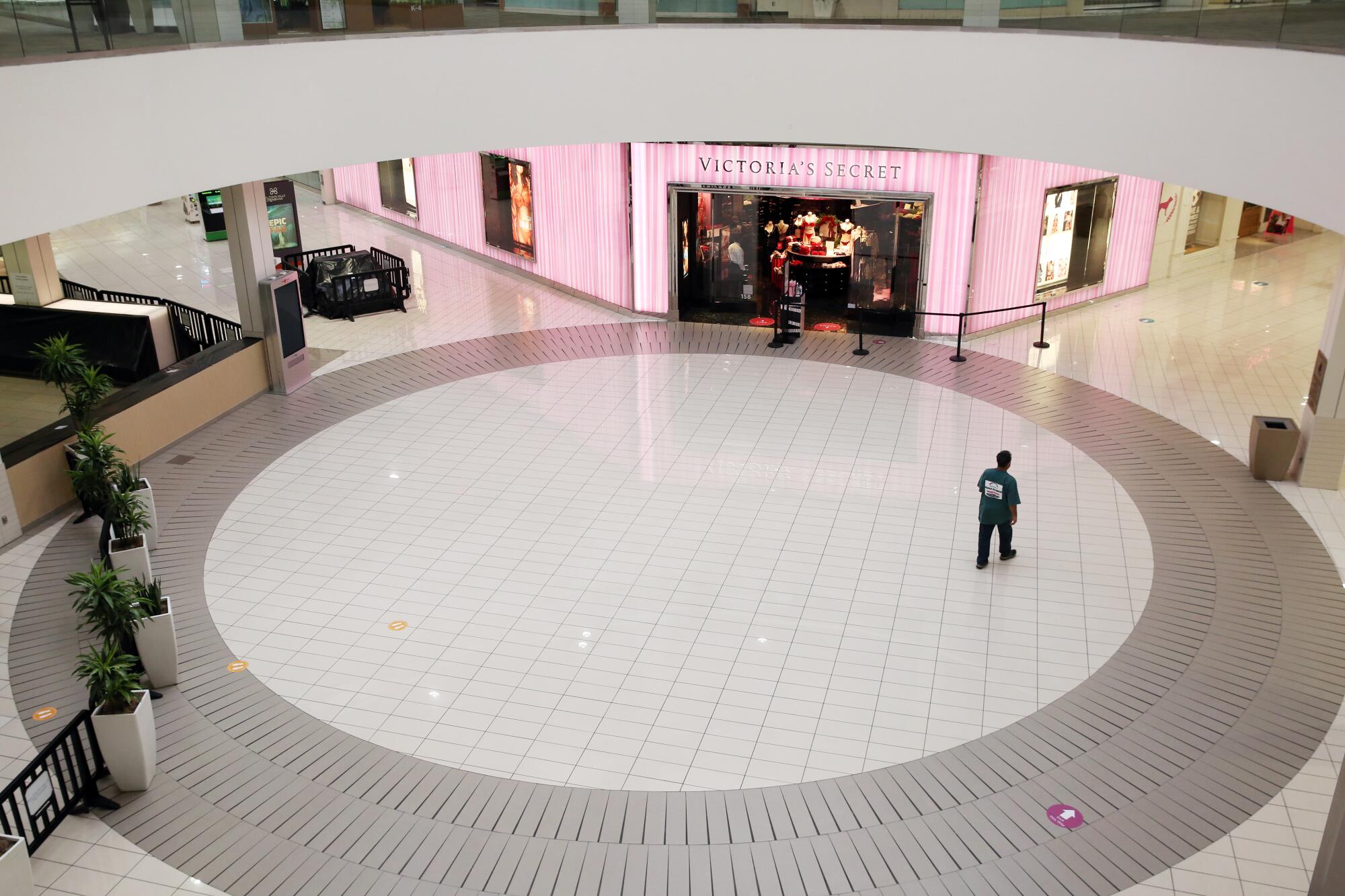
When Southern Girl Desserts first opened in 2012, its owners were overwhelmed by the amount of foot traffic that poured into the store. But when the Walmart closed, they felt an immediate and sustained decline in customers. Although they recovered from the drop, the rest of the mall hasn’t.
“My thing is, I’m all for growth,” Robison said. “Of course, I have an interest in who the mall is being run by, because we have a business there and we want to make sure that they have our interests at heart, and the interest of those in the community who supported our business over the years.”
She added: “As long as it sounds like something that can be positive, to bring growth to the community and the surrounding area, and even possibly bring dollars, then I’m all for it.”
Others are wary, and worry the mall will be rebuilt from the ground up.
“This is a community-based mall,” Muhammad said. “This is historic, [73 years]. This is the oldest mall in the city and you hear them trying to tear it down, you’re tearing down history.”
More to Read
Sign up for Essential California
The most important California stories and recommendations in your inbox every morning.
You may occasionally receive promotional content from the Los Angeles Times.
